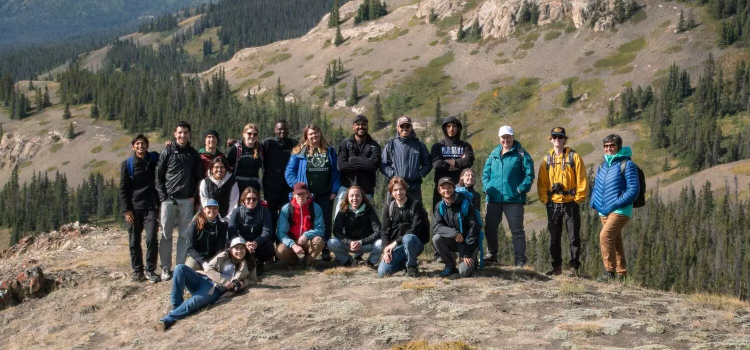
The UCalgary students learned how northern and remote communities are vulnerable to the decisions and actions of all Canadians.
Imagine being surrounded by snow-capped mountains, icy rivers and miles of Arctic wilderness while you learn about sustainability in Canada's north.
This summer, a group of Schulich School of Engineering students immersed themselves into the experience as part of a week-long field camp to the Arctic Institute of North America's Kluane Lake Research Station (KLRS).
Located 220 kilometres north of Whitehorse, Yukon, the camp is part of a mandatory course in the Sustainable Systems Engineering (SUSE) program. Students are taught about major issues facing northern parts of the country, including food, water and energy.
Those who took part in the Aug. 17-25 trip quickly realized how unique the opportunity was going to be.
"The term field course' really doesn't capture how different the experience was from our ordinary classes," says third-year student Noah Tan. "The close community and the stunning location meant that the lecture content was constantly being supplemented with real-world examples, and even outside of class we would be bouncing those ideas off each other, bringing our learning to a whole new level."
The experience has left an undeniable mark on the students, which is exactly what course co-ordinators were hoping for.
A breathtaking view
Tan says when he first heard about SUSE, he was immediately intrigued by the course and admits it was a big reason why he joined the new program.
He loved the idea of the remoteness, the scenery and the potential to learn about a place few people get the chance to visit.
"On one hand, it was super eye-opening to be able to learn about sustainability and climate change in a place that is so closely tied to those topics," Tan says. "We got to hear the stories straight from the locals, see the changes in the environment with our own eyes and connect deeply with what we were learning."
One of the highlights of the field trip was a final-day hike at Kluane National Park southwest of the station. Third-year student Julia Strelioff says the views were stunning.
"Before 2016, there used to be a river from glacier runoff that fed Kluane Lake, but the route changed and the area is a bare valley," she says. "Being able to view the area after the change was truly astounding as it shows just how quickly nature will adapt."
Like Tan, Strelioff says being able to hear directly from people who live in the area made the experience much more meaningful.
Jessica Bekker, an assistant professor (teaching) in the Department of Electrical and Software Engineering, says it's important for students to understand how northern and remote communities and people are vulnerable to the decisions and actions of all Canadians.
"They are often at the forefront of changing climates and are most vulnerable to being left out of the energy transition due to their remote locations and their antiquated diesel systems to supply costly electricity and heat in the north," she says. "I hope the students consider the impacts of technology and energy systems to Canada's remote and norther communities in their learning and future careers."
Engineering through a new lens
While the sights and learning were major highlights for the students, another key aspect they enjoyed was being able to share the opportunity with others.
Third-year SUSE student Chris Speers says they would regularly talk about what they were learning about and would learn from each other as well. In the end, it brought everyone closer together.
"The fact that we got to sit around by the fire at the end of the day and have conversations to really reflect on everything we learned was huge," Speers says. "We would play games and have light-hearted conversations as well, but it was amazing to see everyone talking about such complex issues in depth and with such passion."
A world worth protecting
The week spent north of Whitehorse wasn't just inspirational for the students, but also for the Schulich faculty members involved.
Dr. Tricia Stadnyk, PhD, says the scale and scope of rapid climate change is on display when visiting the Kluane site, along with the direct and fragile connection between humans and ecosystems.
"The world we knew is gone the horse has left the barn," says the Department of Civil Engineering professor. "The challenge is not how to stop the changes being imposed on natural systems, it's about how to adapt to them."
"Make them fall in love with this place so they see a world worth protecting."
Stadnyk says this means rewriting the design standards and criteria for a future that we don't fully understand yet, while many of our traditional methods of design are no longer adequate, accurate or viable.
Course co-ordinator Dr. Kerry Black, PhD, says it's an all-encompassing experience that is meant to make students think about the big picture.
"The goal of the Northern SUSE course is to encourage students to think through engineering from a different context and lens, to re-evaluate how they understand the world, and to be inclusive to different ways of knowing and understanding," says Black, who is also in the Department of Civil Engineering. "Ideally, students understand that a one-size-fits-all approach is limiting, and that context is critical to design."
Learn more about Sustainable Systems Engineering at the Schulich School of Engineering.










